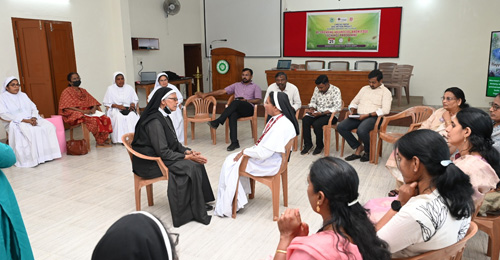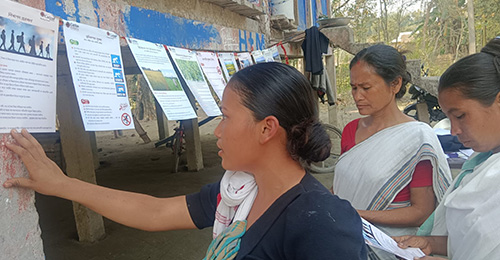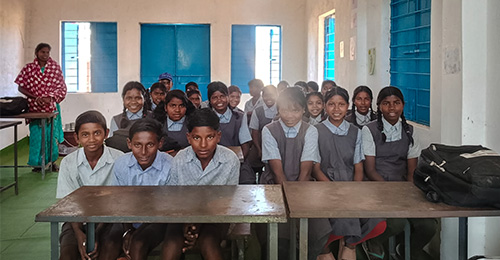Caritas India Works for Holistic Development of Communities

“Caritas India interventions are intended to empower communities and to ensure that communities lead a healthy and happy life. Caritas India is committed to helping communities achieve well-being at individual level and prosperity at society level”. Bishop Lumen Monteiro, Chairman of Caritas India, said this while addressing a community meeting organized at Girwalpura village in Dhar district of Madhya Pradesh.
Caritas India chairman, during his two-day visit to JEEVIKA intervention areas, appreciated communities for their spirited efforts to achieve results in the sectors of good governance, livelihoods, and sustainable agriculture.
Bishop Lumen appreciated communities, particularly women, for working courageously and tirelessly to bring about good governance in the villages. “Gram Sabha can provide solutions to all development challenges of the village. It is the responsibility of communities to ensure that Gram Sabha realises its potentials”, Bishop Lumen said.
Caritas India had supported seven Diocesan Social Service Societies (DSSSs) to implement JEEVIKA in 104 villages in Madhya Pradesh. JEEVIKA had helped over 5400 households to tap benefits of various government schemes and programmes by participating actively in local self-governance processes. Caritas India chairman, during his visit also interacted with community members who had started various income generation activities like goat-rearing, cattle-rearing, poultry, petty shops, etc.
Over 3300 households had started alternative livelihoods and micro-enterprises with the help of JEEVIKA. Significantly, most of these micro-enterprises and livelihoods are now managed by women who are members of 270 Community Based Organisations (CBOs) that were raised and strengthened by JEEVIKA partners.
During the community meetings, Ms. GeetabaiNingwal, Sarpanch of Girwalpura and Mr. Dinesh Yadav Sarpanch of Naharkhedi panchayat presented certificates of appreciation to Bishop Lumen and thanked Caritas India for the continued support to the development of their villages. The Sarpanch said that Caritas India-supported JEEVIKA programme has strengthened the unity of communities and helped communities fight backwardness and poverty.
Fr. Paul Moonjely, Assistant Executive Director of Caritas India, spoke on the occasion and reiterated the commitment of Caritas India to continuously strive for the empowerment of communities. “Caritas India strongly believes that development can become sustainable only when communities become subjects of change. The success of JEEVIKA is a testimony that even poor communities can become agents of change if there is a collective will to work together”, Fr. Paul said. He listed the benefits of environmentally-sound agriculture practices and said that people cannot live a healthy life as long as they do not have healthy food to eat. “Impressively, JEEVIKA has created awareness among communities on healthy agriculture practices and the merits of organically-grown food”, Fr Paul added.
Bishop Lumen and Fr. Paul also visited villages where Kripa Social Welfare Society (KSWS) has been implementing JEEVIKA project. During their visit to the intervention areas in Ujjain, they interacted with the office-bearers of a women-led dairy cooperative of BadarkhaBabaji. Fr. Simon Raj, director Indore Diocesan Social Service Society (IDSSS) and Fr. Sunil George Konnackal, director of Kripa Social Welfare Society (KSWS) and Dr. Saju MK, Zone Manager-West of Caritas India, accompanied Bishop Lumen and Fr. Paul during their visit to the JEEVIKA intervention areas.
Upcoming News
Strengthening grassroots recovery in Wayanad through Safe Within Project
Caritas India strengthened community centred disaster recovery through a four day accompaniment support visit to...
LEARN MOREFlood‑prone communities in Assam and Tripura are better prepared through We4Resilience
The We4Resilience Campaign under Caritas India’s SARAL (Strengthening Adaptation, Resilience and Livelihoods) project, supported by...
LEARN MOREChildren Lead the Fight for Safe Education
In Remhla, a small forest-surrounded village in the Sarguja district of Chhattisgarh, the middle school...
LEARN MORE



 91 -11 - 2336 3390
91 -11 - 2336 3390  director@caritasindia.org
director@caritasindia.org 